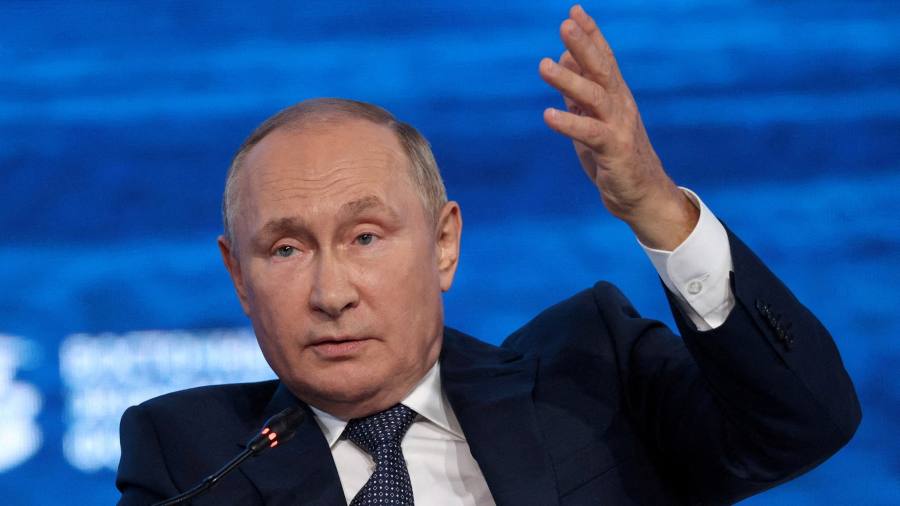[ad_1]
Vladimir Putin has criticised a grain deal hashed out with Ukraine that unblocked agricultural products trapped in the country by his government’s military assault, appearing to threaten an agreement that had eased a growing global food crisis.
In a speech on Wednesday, the Russian leader blamed global grain shortages — which have particularly affected poorer countries — on the terms of the deal brokered in July, rather than on the war launched by Russia against Ukraine, a major grain exporter.
He claimed that grain shipments released by the deal, which ended Russia’s blockade of Ukraine’s Black Sea ports in the Odesa region and enabled cargo vessels carrying grain and other food to restart deliveries, were not heading to poor countries but to EU members instead.
Addressing a session of an economic forum in the far eastern Russian city of Vladivostok, Putin suggested that routes for the export of Ukrainian grain would have to be changed in some way, appearing to threaten the future of the deal.
All Black Sea grain shipments are logged by the UN, which brokered the deal. According to its public logs, more than 2mn metric tons of grain have been transported from Ukrainian ports on 87 ship voyages since the deal was penned.
Of these, 30 have travelled to the EU, while 57 shipments have gone to other countries, including to China, Egypt, India, Iran and Lebanon, and 32 to Turkey.
“The first major purchases now of grain from Ukraine come from the [UN] World Food Program,” said James O’Brien, sanctions co-ordinator at the US state department. He added that in previous years Ukraine had contributed about half of the WFP’s annual food supplies.
“A reason that’s so important is the signal it sends to Ukraine’s farmers. Now they know they can plant wheat for next year because the major buyer is back in the market,” O’Brien said.
Ukrainian’s infrastructure minister described the Russian leader’s claims as “fake”. Oleksandr Kubrakov said in a tweet: “Threats and fakes are typical for Russian politics.”
Putin’s remarks were part of his broader attempt to reframe the narrative around the invasion of Ukraine and the fallout for Russia. He presented the war as beneficial for Russia so far in political terms, and not as damaging economically as most observers believe it to be.
Russia’s economy, Putin said, will decline by only about 2 per cent this year, although most economists believe the drop will be many times sharper, after sweeping sanctions roiled its supply chains and left it isolated from the global economy.
“We have not lost anything,” Putin said. “The main gain has been the strengthening of our sovereignty.”
Joined at the economic forum by a small cohort of international leaders — the heads of Myanmar, Mongolia and Armenia — Putin said Russia had no need for ties with the west.
“A certain polarisation is taking place, both in the world and within the country, but I believe that this will only be beneficial,” he said, adding that everything that prevents Russia “moving forward” will be rejected.
Sanctions, Putin said, were harming the west more than Russia. He also claimed that Moscow was finding it easy to find other buyers, for example in China.
But most of Russia’s gas pipeline infrastructure points to Europe, and Moscow cannot simply redirect gas sales to anywhere other than its domestic market. Sales to Europe previously made up more than 70 per cent of Russia’s gas export total.
“In the long term Russia is losing forever its largest and most reliable export market,” said Greg Molnár, an analyst at the International Energy Agency.
Ursula von der Leyen, president of the European Commission, said on Wednesday that Russian pipeline gas now accounts for just 9 per cent of the EU’s gas imports, down from 40 per cent before the war. “Our work is paying off,” she said.
However, Russia still retains a share of the EU’s gas market that is roughly comparable with Saudi Arabia’s share of the global oil market.
Russia opened a gas pipeline to China in 2019 but, although Putin said demand for Russian energy in China is rising, this pipeline is fed by different gasfields to those supplying Europe.
Russia has long aimed to connect up its Siberian fields, which traditionally supply Europe, to China, with a line known as Power of Siberia 2.
Putin said the key parameters for the sale of gas along this new pipeline, which is not yet under construction but is expected to run through Mongolia, had been agreed. Mongolia said in July that construction of the line was likely to begin in 2024.
Although Russia has repeatedly cut gas supplies to Europe since the start of the war in Ukraine, it has blamed the interruptions on technical issues with its turbines. On Wednesday, Putin repeated the claim that Russia is not using energy as a weapon.
He also described caps proposed by Europe on Russian gas prices as “stupidity”, saying they will lead to price rises. Putin said Russia would walk away from energy contracts, cutting off supplies, if the caps were imposed, warning the west would end up “frozen”.
“We will not supply gas, oil, coal, heating oil — we will not supply anything,” Putin said.
[ad_2]
Image and article originally from www.ft.com. Read the original article here.

